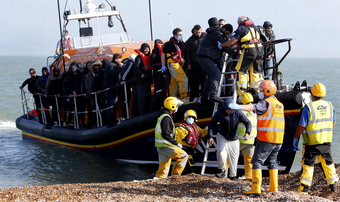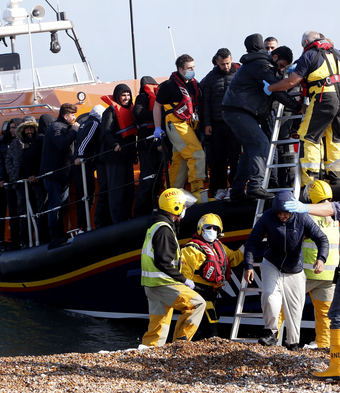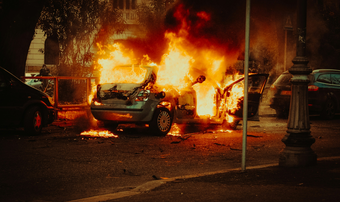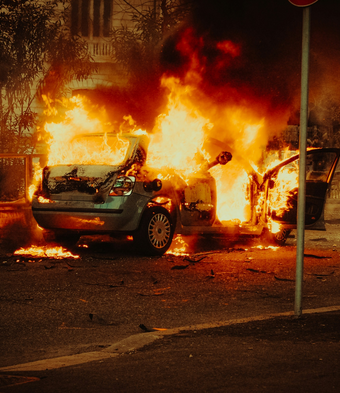The World at War
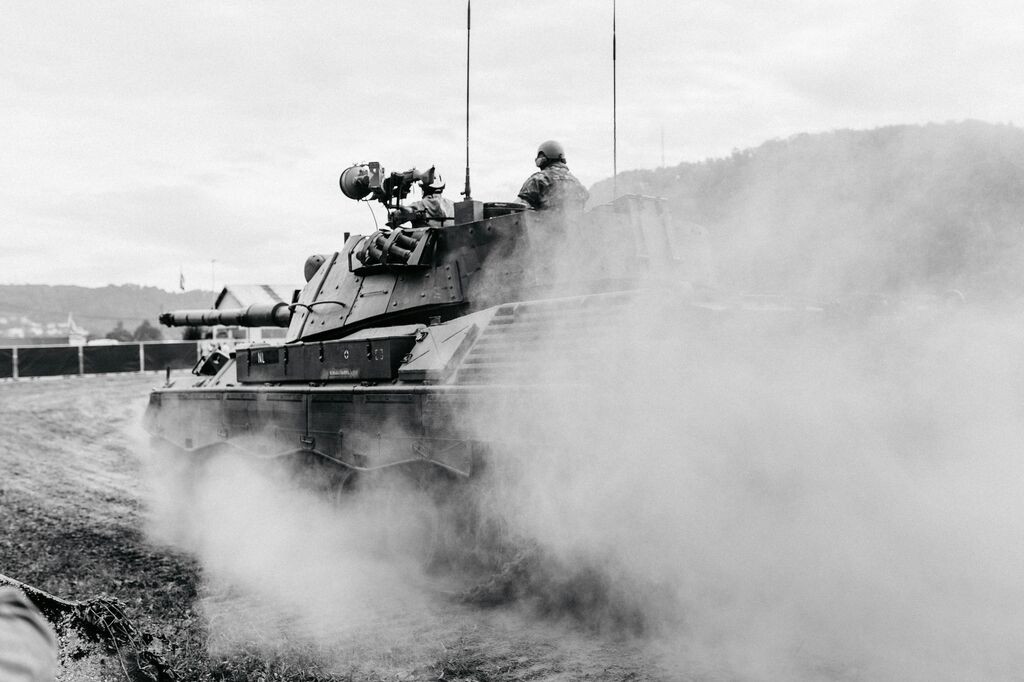
It is hard to shake the sense that the world is increasingly in turmoil.
Each week, sometimes each day, news headlines beamed to our screens and scrawled across our newspapers recount new tales of horror, barbarism, and conflict.
In this last week alone, British and US forces launched airstrikes against Houthi rebels in Yemen, South Africa has accused Israel of genocide at the International Court of Justice, Iran launched airstrikes on Pakistan, before Pakistan then retaliated, North Korea has undertaken new nuclear weapons tests which are viewed as a ‘provocation’ by the South, and the Chairman of NATO’s Military Committee has warned of global war urging nations to become ‘war ready’.
This isn’t the first week to be dominated by headlines of war and conflict. In our era of 24/7 news and social media timelines we have perhaps become accustomed to reports of catastrophic violence in the world.
9/11, Afghanistan, Iraq, Syria, Libya, Islamic State, Ukraine, Israel/Palestine have been the bread and butter of much journalistic coverage in my lifetime and sadly there are far more wars that could be reported than just these.
After such an introduction, it seems almost crazy to say it, but this has largely been considered a time of peace, at least for those of us who live in the West.
Of course, we have been involved in conflicts (the infamous Iraq and Afghanistan to name just a few) but these have been distant, affecting, or appearing to affect, the average UK citizen very little. For those who don’t spend their days traipsing through news headlines for a living, it would have been quite possible to spend the past 20-25 years relatively unaware of war, conflict, terrorism, and bloodshed.
It's also not just a feeling, there are scholars and reports that contend that the world has become a less, not more, violent place in recent years. For example, one report argues “Analysts and conflict scholars have noted widely that the incidence of armed conflict in the world had actually decreased substantially in the past few decades before spiking in 2014–2015. Interstate war (that is, war between states) has become a rare event. And while territorial and other disputes between countries persist, analysts and conflict scholars argue that they are much less likely to escalate to interstate wars.”
For many this is merely an academic debate, with 2019 estimates suggesting “about 2 billion people, circa a third of the world’s population, currently lives in countries affected by conflict” rightly putting such talk into striking context. We have been, and are, very privileged to be able to assume life is peaceful.
However, my point is this: wars have happened and are happening, but for the vast majority of us in the United Kingdom in the Twenty-First Century war is distant and unfamiliar. Whatever notion of war we have is poured forth to us through films, news reports, video games, and social media newsfeeds whilst we sit in the comfort of our homes safe and secure from bombs, warlords, and the awful realities of war.
And it is precisely this distance, and the accompanying comfort, that has been challenged by three major developments.
The first of these was the fall of Afghanistan. At the turn of the century there was much talk of peace and prosperity and of the perceived inevitable victory of liberal democracy and capitalism being spread to every corner of the globe. If there was an arc of history, it bent towards Western-style democracy.
There was plenty to question and challenge this narrative for those that looked for it, but with the fall of the USSR and the prosperity and seemingly untrammelled power of the United States what could stand in the way? Through free trade, international institutions, and economic prosperity, the world could be remade into heaven here on earth.
Of course, it wasn’t long before the War on Terror came along, sparked by the brutal terrorism of 9/11, but even in the American response, this utopian dream never really died. Both the forthcoming invasions of Iraq and Afghanistan morphed in their aims and goals into a project to remake both nations in the image of America.
Fast forward twenty years, and the West found itself utterly shocked by the sudden collapse and implosion of the Afghan state to the advancing Taliban.
The failed Arab spring of the early 2010s had perhaps already demonstrated that Western-style liberal democracy was not the natural path for many nations, but the collapse of Afghanistan brought into question the very creed of the West. Despite all the money, time, and most importantly, lives devoted to the cause, the collapse of Afghanistan was not simply a dismissal of Western-style democracy but the replacement of Western-enforced norms with an utterly opposing narrative.
The second, and perhaps most important, was the invasion of Ukraine. The return of war to the European continent was not within the realm of Western expectations. War simply does not happen between two nations, we thought.
The War on Terror and civil wars of the late 1990s and early Twentieth Century had taught us that war happens within states (so-called intrastate wars) but not between states (interstate wars). Rogue actors, terrorist groups, warlords, oppressive dictators and organised crime, all might have cause to create conflict but on the international scene states simply do not go to war with each other.
In the assumptions of our rules-based international order built around the UN, as well as other international bodies like the IMF, WHO, etc., all disputes or issues are settled through reasoned conversation and debate.
The actions of Putin’s Russia posed a direct attack on this way of doing things and brought war to the backyard of the Western powers. Fears of Russia sweeping away the continent or of an outbreak in global nuclear Armageddon, fears that had been banished since the 1990s, came surging back into the Western consciousness.
Despite our institutions, despite our trade deals, despite sanctions and strong words of condemnation, war has once again come to the continent with major social, political, and economic repercussions that affect the average citizen and make very real the once distant pressures of war.
The third of these challenges was the Hamas terrorist attacks of the 7th October. Perhaps it is too soon to pass comment on the impacts of that day in the Western consciousness, but let me try.
If the fall of Afghanistan and the invasion of Ukraine mounted direct challenges to the Western understanding of the world and its place in it, the events of the 7th October were the hammer blow that drove a wedge right through the heart of the Western world.
As I commented on at the time, the response across Western cities to the barbarism revealed a society living by a broken narrative, desperately wrestling with concepts of right and wrong, good and evil.
The complexities of this conflict do not match well with our overly-simplified cookie-cutter morality in which every situation comes down to oppressor vs oppressed. The lines here are far more blurred.
The events of last October running up to this day have also posed uncomfortable questions to our Western secular-liberal sensibilities by showing that religion still matters. For the aims of Hamas were (and are) not primarily economic, strategic, or political, (though there are elements of these things present) but rather religious.
It is hard therefore, to escape the sense that the Western constructed and led global order is on its last legs, if not already in retreat. Actors such as Hamas, who are unwilling to play by the Western rule book, to abide by international norms and institutions, and who are not only challenging the Western narrative but seeking to construct a directly contradictory one all lead to the gnawing sense that life as we know it is on its way out.
The world is in turmoil. War looms in our consciousness. Death, destruction, and decay form the backdrop for the stage that is the geo-political scene.
Sadly, the Bible warns us that this will be the case, that in many ways war is the norm in this broken life.
Jesus says in Matthew 24 “You will hear of wars and rumours of wars, but see to it that you are not alarmed. Such things must happen, but the end is still to come. Nation will rise against nation, and kingdom against kingdom. There will be famines and earthquakes in various places. All these are the beginning of birth pains.”
Ecclesiastes mentions there is “a time to love and a time to hate, a time for war and a time for peace.”
The grim reality is that ever since the fall, man has killed man. Indeed, we see the seeds of war and conflict in Cain’s murder of Abel in Genesis 4, and in Lamech’s domineering aggression just a few chapters later.
War is a sign that something has gone utterly, terribly wrong in this world.
The outbreak of conflict and the perpetration of violence en masse are rooted in the flawed heart of humanity itself. It is a fruit of a disordered love, a heart turned away from God and bent in on itself.
Understanding the diagnosis of the problem is key to finding any solution. For it is a solution that we ought to seek.
Peace is at the heart of the gospel narrative. Peace is the destiny of the gospel that Isaiah points towards:
“He will judge between the nations and will settle disputes for many peoples. They will beat their swords into plowshares and their spears into pruning hooks. Nation will not take up sword against nation, nor will they train for war anymore.”
And though the Bible makes allowances for war, war is not something that is, nor can be good. There can be good wars – I would make a strong case that the Second World War was a good war in the sense that its cause was just and valid – but that does not make war a good thing.
Perhaps to demonstrate my point, King David, fought wars against the Lord’s enemies, driving them out of the land that God had given to the Israelites, and yet his bloodshed made him an unsuitable king to build the Lord’s temple.
War, no matter how just or right or necessary, is not good.
Further, the Bible counsels those that fear the Lord to seek peace. Proverbs 16:32 says “Better a patient person than a warrior, one with self-control than one who takes a city.” Ecclesiastes 9:18 “Wisdom is better than weapons of war, but one sinner destroys much good.” And perhaps most famous of all “blessed are the peacemakers” in Matthew 5:9.
Likewise, the Bible is filled with accounts of grief, mourning, and lament in the face of war. Therefore, as believers we ought not be surprised by war, we ought to grieve war, and we ought to seek peace.
This alone is good news for our world. For many, our times are uncertain and unstable, and our assumptions of the world have been shaken. Christianity offers an interpretation of the world that fits with the reality around us; it gives us a reason to mourn, and it gives us a pattern for peace.
Peace is something we can have confidence in and this too is strikingly refreshing. As mentioned, many earthly schemes and kingdoms have plans and designs for peace - be that through the spread of liberal-democratic capitalism as the West has tried, or some other scheme - but though they may achieve peace for a time they do not address the issue of that disordered heart.
Take this comment from Deputy Secretary-General Amina J. Mohammed of the UN last January: “There is only one route to durable peace — the route of sustainable development. It is the only reliable tool with which to break through cycles of instability and address the underlying drivers of fragility and humanitarian need.”
I do not doubt that sustainable development will help, that schemes to lift people out of poverty, or establish better governance structures, or increase dialogue with people won’t make a difference. But fundamentally the problem runs far deeper than economic, social, or political circumstances.
Heart change is needed, and heart change is what Jesus offers – not just to you and to me but to the world. And so, I suggest in a time of turmoil we spread the good news about Jesus. We work hard for peace, taking up his call to be peacemakers, and in so-doing embody His kingdom to come, but all the while we speak of the one who has destroyed the barrier, the dividing wall of hostility, who brought those who were far from God near.
In this time of turmoil let us be people who turn to God as in the Psalms.
The Lord is my light and my salvation—
whom shall I fear?
The Lord is the stronghold of my life—
of whom shall I be afraid?...
Though an army besiege me,
my heart will not fear;
though war break out against me,
even then I will be confident.
(Psalm 27)
Come and see what the Lord has done,
the desolations he has brought on the earth.
He makes wars cease
to the ends of the earth.
He breaks the bow and shatters the spear;
he burns the shields with fire.
(Psalm 46)

